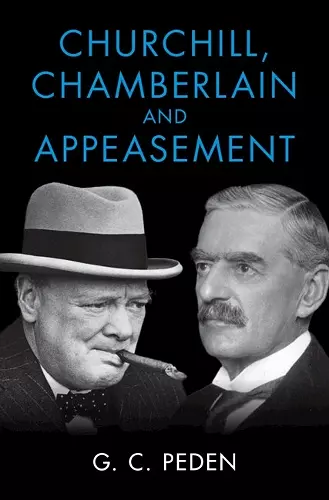Churchill, Chamberlain and Appeasement
Format:Hardback
Publisher:Cambridge University Press
Published:1st Dec '22
Should be back in stock very soon
This hardback is available in another edition too:
- Paperback£29.99(9781009201964)

The first study to compare Churchill and Chamberlain systematically in relation to appeasement and defence policy in the 1930s.
A major new account of appeasement and the question of whether the Second World War could have been prevented. G. C. Peden provides a comparative analysis of Chamberlain and Churchill's view on foreign policy, how best to deter Germany and explores what deterrence and appeasement meant in the context of the 1930s.Was Churchill correct when he claimed the Second World War could easily have been prevented if Chamberlain had not appeased Hitler? How far did Churchill and Chamberlain differ on defence and foreign policy? To what extent was Chamberlain responsible for military defeats in 1940? In this new account of appeasement, G. C. Peden addresses these questions and provides a comparative analysis of Chamberlain and Churchill's views on foreign policy and strategic priorities, explores what deterrence and appeasement meant in the military, economic and political context of the 1930s and where Chamberlain and Churchill agreed and disagreed on how best to deter Germany. Beginning in 1931 when Chamberlain became Chancellor of the Exchequer, this book explores the evolution of British policy towards Germany through to the Munich Agreement and its aftermath within the context of Britain's power to influence international affairs in the 1930s and of contemporary intelligence.
'A masterly analysis that takes a fresh approach to appeasement, based on the author's expert knowledge and understanding of both policies and personalities.' Gill Bennett, Former FCO Chief Historian
'A rigorous and compelling new look at one of the most important episodes in twentieth-century British and European History.' Richard Toye, University of Exeter
'Chamberlain, the man with the umbrella, and Churchill, the man with the cigar, were both brand names by 1930 … Chamberlain's dramatic flight to meet Hitler at Munich in September 1938 meant that the word 'appeasement' was associated with him as clearly as if it had been tattooed on his forehead. Churchill's opposition to the Munich Agreement was equally dramatic … But G. C. Peden suggests that the contract between the two was less black-and-white than it first appears.' Richard Vinen, Literary Review
'This well-researched and scholarly book brings together Peden's earlier specialities and publications with fresh perspectives and work … A book to enjoy as well as to consider.' Jeremy Black, Journal of European Studies
'Peden's book will be the definitive history of the Churchill-Chamberlain relationship for some time to come.' Peter Neville, Diplomacy & Statecraft
'Peden's contribution to the historiography is to juxtapose a close reading of the diplomatic sources with analysis of the structural strengths and weaknesses of the British economy as they related to rearmament. The result is not a revolutionary reinterpretation, but rather a more nuanced reading of what could realistically have been accomplished in the lead-up to September 1939 … Recommended.' F. Krome, Choice
'Accessible and engaging.' David M. Valladares, History
ISBN: 9781009201988
Dimensions: 236mm x 159mm x 28mm
Weight: 750g
418 pages